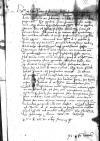Letter #6117
Mauritius FERBER to Ioannes DANTISCUSHeilsberg (Lidzbark Warmiński), 1537-02-23
| received 1537-02-28 Manuscript sources:
Auxiliary sources:
| ||||||
Text & apparatus & commentary Plain text Text & commentary Text & apparatus Excerpts concerning Dantiscus' travels
Reverendissimo in Christo Patri et Domino, domino
Reverendissime in Christo Pater et Domine, domine frater et amice carissime ac plurimum honorande.
cf.
Quod vero Reverendissima Dominatio Vestra exhibet se brevi me visitaturum, perquam libentissime audio. Erit mihi optatissimus atque gratissimus hospes. Ceterum in arbitrium eius repono, an mavelit(!) nunc in Quadragesima, an post Paschatis festa venire. Hoc unum ante omnia consulo, quod Dominatio Vestra Reverendissima tum ex
Quod ad
Quod reliquum est, Reverendissimam Dominationem Vestram conservet et prosperet in omnibus Iesus Christus, ad mutuum colloquium.
Ex
Reverendissimae Dominationis Vestrae in omnibus sincerus frater

